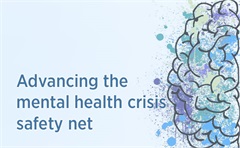Antibiotics are critical to effectively treat infections. But unnecessary or inappropriate use can cause harm to patients or contribute to antibiotic resistance.
“Antimicrobial stewardship works to evaluate how antibiotics are prescribed by clinicians and used by patients and to improve use by promoting optimal antibiotic drug regimens: dose, duration, as well as route of administration,” shares Jessica McDonald, pharmacist, PharmD, co-lead for Mount Nittany Medical Center’s antimicrobial stewardship program. “We look at everything from appropriate use and not overusing, which can lead to resistance and other infections, to education on evidence-based guidelines.”
The service began in 2012 with three pharmacists and an infectious disease physician working on projects. It has since grown into the multi-disciplinary team it is today with responsibility for implementing and maintaining treatment guidelines, education, order sets, and ensuring compliance with regulation. Individuals from pharmacy, pulmonary and critical care, infection prevention and control, microbiology lab, hospitalists, and the emergency department meet monthly.
The program follows The Joint Commission Standards as part of accreditation, as well as the Centers for Disease Control and Prevention (CDC) Core Elements of leadership commitment, accountability, drug expertise, action, tracking, reporting, and education. The Joint Commission is an independent organization that accredits and certifies healthcare organizations across the country and promotes safe, effective care.
The program offers many services across the Medical Center, all with the goals of improving patient outcomes, slowing the emergence of antimicrobial resistance, and decreasing healthcare costs.
“One of the things we do is assist in the development of an annual antibiogram,” explains Amanda Holyk, pharmacist, PharmD, BCCCP, co-lead for the program. “It provides pharmacists and providers with local antibiotic susceptibility. Local resistance patterns look completely different from New York City or somewhere out west. The antibiogram helps in selecting an antibiotic and preserving its effectiveness.”
Selecting the appropriate antibiotic, dose, duration, and route of administration is challenging. The CDC estimates that 20-50% of antibiotic use across the healthcare industry is inappropriate.
“We review patient antibiotic therapy at the bedside level on a daily basis to ensure it’s appropriate for the particular infection, that it’s not too broad or too narrow for the patient, which has the potential for long term implications,” shares Holyk.
They also work to optimize dosage based on the site of infection. An antibiotic used to treat the same infection in the lungs or bladder may need a different dosage due to variances in drug penetration. Liver or kidney dysfunction is also factored in. Pharmacy consult services are offered seven days a week to help prescribers select the right treatment for each patient.
“We have spent a lot of time over the last year or so to improve education of staff—not just pharmacists, but physicians and mid-level providers,” adds McDonald. “And we tailor it to the specific setting they work in. For instance, we held a lunch and learn in the ED based on prescribing specific to the common infections they see.”
With its responsibility for developing and maintaining treatment guidelines and order sets, the program must conduct frequent literature reviews to make sure everyone in the Medical Center is using the most up-to-date evidence to inform care decisions.
The program focuses on the most common conditions, such as lower respiratory infections, urinary tract infections, skin and soft tissue infections, chronic obstructive pulmonary disease (COPD), sepsis, and C. difficile.
Over the past several years the program has worked collaboratively with infection prevention and control to reduce the number of new and recurrent C. difficile infections in the community. Tactics include an order set specific to the infection, outlining preferred antibiotics to both prevent and treat the infection, training pharmacists on appropriate de-escalation protocols for antibiotics, and educating on C. difficile testing and interpretation.
Another highlight of the program is the implementation of a dalbavancin protocol for patients in the emergency department who have a severe skin infection. Traditionally these patients would need to be admitted for a few days to treat the infection. With the protocol, patients receive one intravenous dose of dalbavancin in the emergency department and are then discharged home, without a costly hospital stay and with limited exposure to the healthcare setting.
And yes, the program has been actively involved in Mount Nittany Health’s response to COVID-19, developing treatment guidelines, providing education to staff and providers, and coordinating the Medical Center’s use of remdesivir.
The antimicrobial stewardship program at Mount Nittany Medical Center is a testament of its commitment to provide safe, high-quality, cost-effective care to the community. It is one way we fulfill our mission of making people healthier.







